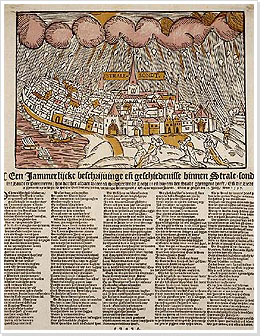Broadside ballads > Street genres
 What kinds of song were sung on the streets? Some main genres are apparent from the collections of broadsides.
What kinds of song were sung on the streets? Some main genres are apparent from the collections of broadsides.
Sensational songs:
The broadsides were produced quickly and could therefore function as news reports. The bloodiest murders, the worst feats of villainy and the biggest disasters were circulated as songs in a short time.
Begging songs:
From the 1930s onwards, large numbers of begging and complaining songs would appear, written by (or for) the unemployed, invalids and other needy persons, who tried to secure an income this way.
Patriotic and political songs:
Songs have always been sung in the Netherlands about the country, the politics and the royal House of Orange, but their production didn't hit full stride until the nineteenth century. In this period, a large number of well-mannered, bourgeois patriotic songs were penned by writers like J.P. Heije (De Zilvervloot - The Silver Fleet). The number of new songs written to these melodies proved that these songs were definitely picked up by the general public. Not all the songs are of course equally polite: political battles led to a healthy dose of venom and mockery.
Love songs and family songs:
The subject of love is not bound to any specific historical period, but it remains the most popular subject for songs. Happy romances, clownish lovemaking, broken hearts, celebrated in song with or without sentimentality: audiences never tire of it. Families also offer an infinite source of subject matter. These songs are about arguments, misunderstandings, dead parents or children, or - conversely - about domestic bliss.
Farcical songs:
There is a great deal of laughter in songs as well as about them. Mad scenes in drinking songs, outright banality (tits-and-bums humour, poop, pee and sex) in satirical or farcical songs, and sly digs in songs composed for weddings and parties: these elements reappear throughout the ages.
Light music:
Light music, which first appeared in the late nineteenth century, would entertain the listeners with 'feel-good' subjects like a trip to the sea or the woods, or an aunt who could play the harmonica.
